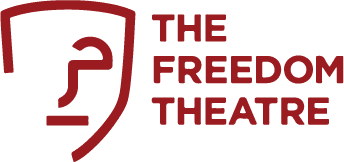“Knowledge is what is left in your Heart”
Drama in Education project at The Freedom Theatre
“The teacher is of course an artist, but being an artist does not mean that he or she can make the profile, can shape the students. What the educator does in teaching is to make it possible for the students to become themselves.” – Paulo Freire, We Make the Road by Walking: Conversations on Education and Social Change
Since October 2012, The Freedom Theatre has been running a Drama in Education (DiE) programme, aiming to provide educators with training in drama as a teaching method. The first group of DiE participants consists of eight teachers for children with special needs in Jenin and Qabatia, a nearby village.
“For The Freedom Theatre, this project is a very important initiative as we follow in the footsteps of Arna Mer Khamis, who always worked with teachers from Jenin and tried to introduce an alternative to the authoritarian educational system in Palestine“, says Jonatan Stanczak, Managing Director of The Freedom Theatre. “Ultimately our aim is the same as Arna’s was: to turn the pyramid of hierarchy in society upside down. The introduction of alternative educational methods is an important step in order to achieve that goal.”
The DiE project has a strong Swedish connection in that it is supported by the Swedish Postcode Lottery with trainers coming from Sweden. Agneta Regell, director and drama and theatre pedagogue, supervises the project and is passionate about its importance: ”If we are ever to change this world, one of the most important issues is how we raise our children; how the new generation is to be taught and brought up. I believe that school is a very good place to start and so drama is a very democratic approach to learning. The teaching profession is extremely important, yet it’s not fully appreciated. Aesthetic subjects are essential for a human being’s development, creativity, imagination, and those characteristics are by no means stimulated in today’s school.”
During the first part of the course the participants had introductory workshops on different kinds of drama methods: creative drama, educational drama, drama therapy, forum theatre, storytelling, puppet making, voice and movement and arts, with an emphasis on storytelling. The DiE team worked intensively on providing the teachers with a basic understanding of different drama methods, to equip them with a set of tools (games, exercises and improvisations). But just as important was to plant the seeds of a new understanding of the pedagogical situation in the classroom. The workshops are based on the idea that children should be active and reflective participants in their own process of development rather than passive recipients with no responsibility for their own learning.
Recently the teachers embarked on the second part of the course, during which they will deepen their understanding of various drama methods, as well as increased application of the drama activities in their own classrooms. Agneta and Fidaa Ataya, Storyteller and Drama Pedagogue at The Freedom Theatre, evaluate their achievements during field visits.
“The DiE course has changed my teaching methods a lot. Before I felt like ”a dot in a big sea” I knew nothing about drama but now I have skills and understanding about how to use DiE and this has completely changed my work.” – Safa Rabay’a, Raba Girls school
“When the supervisors from the Educational Office visited my class they were amazed and commented on how nicely exercises and physical games were used to make the children understand the alphabet.” – Lamia Nazzal, Raba Boys school
“DiE has become very important in my class because before I had difficult children, both shy and aggressive, and my aim was only to teach them how to read and write. I still have the same children but now I have skills also to change their behaviour; I now see the whole child and have discovered that a child has many creative languages.” – Rula Nazzal, Qabatia Girls school [/quote]
The DiE project has shed light on some shortcomings in the school system in Palestine. “Obviously the occupation, the political situation and the lack of financial means cause most of the problems but it is also a question of authoritarian and conservative traditions”, says Fidaa Ataya. “I believe those need to be changed if the Third Intifada, the cultural and educational Intifada, is to give birth to a free and democratic Palestine.”
Support from the Ministry of Education and the local municipalities is extremely important to the success of the project. ”We have had some very positive involvement from local government employees particularly in villages such as Bartaa, Qabatiya and Arabee, where local government employees have even participated in workshops”, says Agneta Regell.
